Car battery corrosion is a common issue that can affect your vehicle’s performance and longevity. Corrosion can lead to poor electrical connections, starting problems, and even battery failure if not addressed promptly. This comprehensive guide will walk you through the process of cleaning car battery corrosion, provide tips to prevent it, and answer frequently asked questions to help you maintain your car battery effectively.
What Causes Car Battery Corrosion?
Corrosion on car battery terminals is typically caused by the release of hydrogen gas from the sulfuric acid in the battery. This gas can react with the metals and environment, leading to the buildup of corrosive materials, usually in the form of a white, ashy substance around the terminals.
Tools and Materials You’ll Need
– Protective gloves
– Safety glasses
– Baking soda
– Water
– Toothbrush or wire brush
– Wrench or socket set
– Battery terminal cleaner (optional)
– Petroleum jelly or battery terminal protectant
Step-by-Step Guide to Cleaning Car Battery Corrosion
1. Safety First
– Park your car on a flat, stable surface and turn off the engine.
– Wear protective gloves and safety glasses to protect yourself from battery acid and corrosion.
2. Locate the Battery
– Open the car’s hood and locate the battery. Identify the positive and negative terminals, usually marked with (+) and (-) symbols, respectively.
3. Disconnect the Battery
– Using a wrench or socket, loosen the nut on the negative terminal first and remove the cable. Then, do the same for the positive terminal.
– It’s crucial to disconnect the negative terminal first to avoid any short circuits.
4. Inspect the Battery
– Check the battery for any visible damage, leaks, or excessive swelling. If you notice any severe issues, it might be time to replace the battery.
5. Prepare a Cleaning Solution
– Mix a tablespoon of baking soda with a cup of water. Baking soda is alkaline and neutralizes the acidic corrosion.
6. Clean the Terminals
– Dip a toothbrush or wire brush into the baking soda solution and scrub the corroded areas thoroughly. The solution will fizz as it reacts with the corrosion.
– For stubborn corrosion, you may need to apply more solution and continue scrubbing until the terminals are clean.
7. Rinse and Dry
– After scrubbing, rinse the terminals and battery surface with clean water to remove any residue.
– Use a dry cloth to wipe the battery and terminals dry.
8. Reconnect the Battery
– Once the terminals are dry, apply a small amount of petroleum jelly or battery terminal protectant to the terminals. This helps prevent future corrosion.
– Reconnect the positive terminal first, followed by the negative terminal. Tighten the nuts securely.
9. Test the Battery
– Start your car to ensure the battery is functioning correctly and that the connections are secure.
Tips to Prevent Battery Corrosion
1. Regular Maintenance
– Check your battery terminals regularly for signs of corrosion and clean them as needed.
2. Use Terminal Protectors
– Install anti-corrosion washers or apply a battery terminal protectant to help prevent corrosion.
3. Keep the Battery Secure
– Ensure the battery is securely mounted in its tray to prevent vibrations, which can cause leaks and corrosion.
4. Check the Charging System
– Have your car’s charging system checked regularly to ensure the battery is not being overcharged, which can lead to increased gas release and corrosion.
Also Read: How Do I Determine if My Car Battery Needs Replacing
Frequently Asked Questions
Car battery corrosion is typically caused by the release of hydrogen gas from the battery acid, which reacts with the metals around the terminals and the environment, leading to a buildup of corrosive materials.
While vinegar is acidic and can clean corrosion, it is not as effective as a baking soda solution, which neutralizes the acidic corrosion more efficiently.
It’s a good practice to check your car battery for corrosion every few months or during routine vehicle maintenance. Regular checks can help prevent buildup and ensure good battery performance.
Yes, car battery corrosion can be hazardous. It can cause poor electrical connections, lead to starting problems, and in severe cases, battery failure. It’s also important to handle corroded batteries carefully, as the acid can cause burns and other injuries.
Corrosion can cause poor electrical connections, which may lead to the battery working harder to deliver power, thus draining it faster. Regular cleaning helps maintain good connections and battery life.
Signs of a corroded car battery include visible white, ashy deposits around the terminals, difficulty starting the vehicle, dim headlights, and electrical issues.
While you can drive with a corroded battery, it’s not advisable. Corrosion can lead to poor connections and starting issues. It’s best to clean the corrosion as soon as possible to avoid potential problems.
If your battery is severely corroded, it might be best to replace it. Excessive corrosion can indicate underlying issues with the battery’s condition or the car’s charging system.
Car batteries contain hazardous materials and should be disposed of properly. Many auto parts stores and recycling centers accept old batteries for recycling.
Yes, many auto repair shops and service centers offer professional battery cleaning services. If you’re uncomfortable cleaning the battery yourself, seek professional assistance.
Conclusion
Regular maintenance and prompt cleaning of car battery corrosion are essential for ensuring your vehicle’s reliability and performance. By following the steps outlined in this guide and adhering to the prevention tips, you can keep your battery in top condition and avoid potential issues. If you have any doubts or encounter severe corrosion, consider consulting a professional to ensure your battery and vehicle remain in optimal working order.




